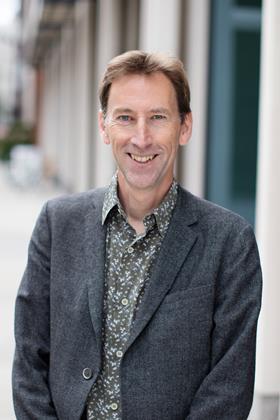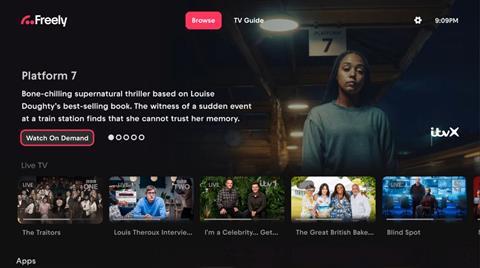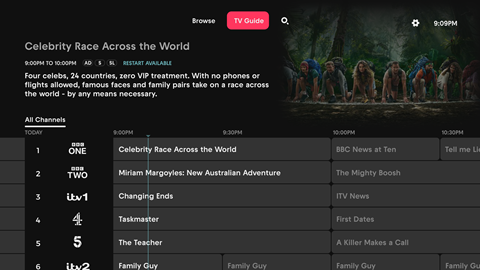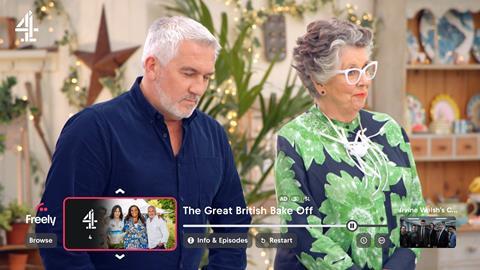Jonathan Thompson, CEO for Everyone TV, explains how the joint venture’s neutrality has helped get the latest iteration of a PSB streaming service off the ground and how its focus on the live experience acts as a “bridge into on-demand content”.
Had the UK’s regulator not blocked a proposed ‘Freeview for the internet’ from BBC Worldwide, ITV and Channel 4 all the way back in 2009 the country’s media landscape might look a lot different today.

As it was, Project Kangaroo never got off the ground. It was kicked into touch for being anti-competitive after the government’s Office of Fair Trading ironically voiced fears ‘that the platform could become too powerful.’
Fifteen years on and YouTube and the international streamers threaten to swamp public service broadcast (PSB).
Is Freely, the latest attempt by UK free-to-air content providers to ensure the future of public service TV, too little too late?
“I hope not! We believe our timing is right,” says Jonathan Thompson, Chief Executive of Everyone TV, the organisation leading the evolution of free-to-view TV in the UK. He was at Channel 4 when Project Kangaroo was killed and says Freely is different in two main ways.
“One is that we are particularly focussed on bringing a live TV experience together in one place in the way that Freeview has always offered, but as a streaming experience,” he adds.
“The other difference is that we’re trying to go with the grain of where the market is going in terms of working in partnership with Connected TV vendors. Viewers are still watching TV on the bigger screen in their home but that screen happens to be a Smart TV. Those Smart TVs are getting better in terms of how they aggregate content and we’re partnering with Smart TV vendors to offer Freely as part of their experience in a way that brings together live and on-demand content from the PSBs, but not interfere in the Smart TV’s wider ecosystem and their user experience.”
Read more Peak TV has been reached and UK public service broadcast is shrinking
Smart partnerships
“It’s never straightforward to get broadcasters on the same page particularly with a project of this complexity” Jonathan Thompson, Everyone TV
Hisense, Freely’s exclusive partner at launch in May, also has Netflix, Amazon Prime, Disney Plus and an array of other streamers on its service.
“We’re evolving the historic model of collaboration that has existed in Freeview and preparing for the streaming age where more people are increasingly or potentially exclusively watching their content over the internet, rather than via an aerial.”
Everyone TV is a joint venture owned and supported by BBC, ITV, Channel 4 and Channel 5 and has existed for 20 years providing a platform for UK PSB collaboration to deliver Freesat and Freeview. That model of proven cooperation helped get Freely off the ground.

“It’s never straightforward to get broadcasters on the same page particularly with a project of this complexity where you’re trying to get different entities with their own different strategies to work together,” Thompson says.
“What has helped our cause is that we are an independent entity acting as a vehicle for collaboration on behalf of our shareholders and one with which they are familiar and comfortable. Another point is that we’re not standing in the way of existing ventures. Freely is not an alternative to iPlayer which the BBC will continue to invest in and develop as its own. What we’re trying to do with Freely is focus on the live experience and use that live experience as a bridge into on-demand content in iPlayer, ITVX, 4 or 5.”
The streaming service has also expanded its lineup to include STV and S4C, bringing the Scottish and Welsh channels to the new platform.
While there is speculation about a merger of one or other of the UK’s broadcasters to better compete economically, the Freely model means each PSB can continue to evolve their own VOD player and VOD strategy. Thompson says they can use the joint streaming service as a vehicle for collaboration and to drive more viewing into on-demand from the live experience.
Backed by broadcasters
“Freely is not an app like iPlayer or Netflix. It is always running and effectively takes over control of certain functionality when the viewer wants to watch live TV” Jonathan Thompson, Everyone TV
Freely is free to the viewer. There’s no commercial transaction with partner Smart TV manufacturers and the platform is not monetised by Everyone TV. Rather, it is monetised by the individual broadcasters themselves.
Thompson explains, “For instance, any monetisation of ITV content, whether it’s the live channel or ITV content on ITVX is monetised by ITV. It’s their customer. It’s their data. We play no part in the ad tech solution. Freely is the enabling vehicle for the syndication and distribution of our shareholder’s live and on-demand content.”
No figures have been released around sales of TVs from partners carrying the service but the keys to success will come down to how widely it can syndicate onto devices.
Thompson says he is “really pleased” with rollout to date which, apart from Hisense, has added the brands Bush, Vestel, Toshiba, Panasonic, Sharp, and Metz TVs.
“We are in discussions with other partners and we’ll be announcing more deals later this year,” he says. “We saw a similar pattern when we launched Freeview Play where you benefit from the millions of TVs that are sold over time and it starts to scale, but we’re in the early stages of that.”
All these new TVs embrace the latest HbbTV standard that released this year and into which Everyone TV had input. It chose the HbbTV Operator Application and worked with the HbbTV Association to update the software. HbbTV OpApp acts like a virtual set-top box inside the smart TV set, enabling operators to provide a branded, uniform user interface across different manufacturers.
Read more Is DVB-I about to save public service media?
“One of the things I’ve been at pains to explain over the last few months is that Freely is not an app like iPlayer or Netflix,” says Thompson. “It is always running and effectively takes over control of certain functionality when the viewer wants to watch live TV. The Operator Application allows a deeper level of integration into the native experience of the device and a greater level of control over the IP-delivered linear channels on the device.”

The new version also enables interactive (‘red button’) applications to appear alongside live playout and for a consistent viewer experience across broadcast and IP-delivered linear channels.
The challenge of maintaining free to air broadcast is not confined to the UK alone. Germany, France, and other countries are facing similar issues. Does Freely offer a path forward?
“Everyone TV are big believes in the ongoing relevance and availability and salience of national broadcasting,” Thompson says. “Regardless of the breadth of global content available from the SVOD players, we continue to ensure that the underlying notion of having easy access to a valuable national broadcasting library on demand is maintained.
“My strong view is that a big part of achieving that is through PSB collaboration. National broadcasters can work together, where it makes sense, to ensure that viewers can find and access that content really easily on the devices that they are using more and more to watch TV.”
Whilst acknowledging the difference in individual TV markets, the macro trends of globalisation and content discovery and the road towards a fully streaming future are common to all. Innovation like Freely can help secure a broadcaster’s own future.
Read more IBC Conference: BBC Studios – thinking FAST in Europe
PSB landscape
“There’s an economic question for the long term sustainability of DTT” ” Jonathan Thompson, Everyone TV
In a report published in May UK regulator Ofcom concluded that delivering TV over the air is no longer economically viable and charged the TV sector and the government with planning for a future of near total reliance on broadband networks. One scenario was to sunset DTT whilst ensuring digital inclusion and support for those reliant on terrestrial delivery. As a former Director of Strategy for both Ofcom and Channel 4, Thompson has extensive experience working in the broadcasting sector and the regulatory environment.
“There are big existential questions that needs to be thought about from a policy perspective within government,” he says. “I would point out that broadcast DTT, whether it’s satellite or terrestrial, still contributes a large volume of viewing. Sometimes we forget this. In the UK, there are lots of homes which are still either reliant on or heavy users of terrestrial TV. So DTT is definitely here for some time to come.

“Nonetheless, the direction of travel is that more and more homes are spending more time streaming. An increasing number of households are effectively internet only and not connecting an aerial to their TV. It’s maybe 20% of homes today but that share is forecast to grow to half of TV homes by the end of this decade.”
Thompson responds to the two principal questions Ofcom raised in its report. One of these is about the long term economic sustainability of DTT. “The cost of running DTT infrastructure will reach a point where it becomes an increasingly challenging platform for broadcasters to justify investing in if it’s only reaching a small proportion of homes,” he says.
“The second question is how we transition to a fully internet future to ensure universal access. We did something similar successfully with analogue switch over in the late 2000s. There are a minority of home owners who are very heavy users of DTT who are nervous about internet connectivity. So, there’s an economic question for the long term sustainability of DTT and a big policy question around any transition to ensure no one gets left behind.
“That’s something that the industry, the broadcasters and government need to collectively solve over the next year or two.”
Jonathan Thompson will present ‘Freely – collaboration for the streaming age’ on Friday, September 13.
Read more IBC Conference: Beating fake news - inspiring trust in the age of disinformation
























No comments yet